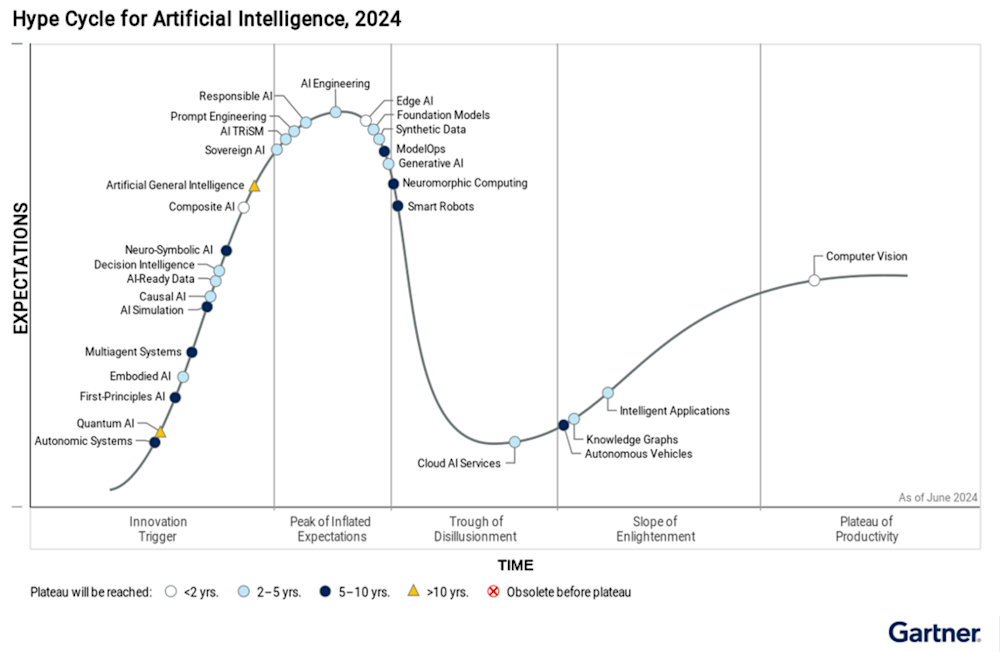Insights
Welcome to the Trough: Where AI in Pharma Gets Real or Goes Home
Written by Rick Ritacco — 2025-06-10.
For the last two years, AI in pharma has ridden high on the hype cycle. Headlines promised generative breakthroughs, AI-first drug discovery, and pipelines powered by machine learning. But 2025? It’s different. According to Gartner’s latest Hype Cycle1, generative AI has officially peaked. We’re sliding into the “Trough of Disillusionment”—and that’s not a bad thing.
Welcome to the Trough: Where AI in Pharma Gets Real or Goes Home
For the last two years, AI in pharma has ridden high on the hype cycle. Headlines promised generative breakthroughs, AI-first drug discovery, and pipelines powered by machine learning. But 2025? It’s different. According to Gartner’s latest Hype Cycle (1), generative AI has officially peaked. We’re sliding into the “Trough of Disillusionment”—and that’s not a bad thing.

This is the moment when reality tests resolve. The AI pilots that dazzled on stage but delivered little on the bottom line? They’re quietly getting shelved. One recent report showed that 42% of companies have already abandoned most of their generative AI pilots, up from just 17% last year (2). While those figures are not specific to the healthcare industry, we are certainly seeing the ripples of the precipitous cannonball off the hype apex in our space as well. Biotechs like Exscientia and Recursion, once AI darlings, have announced major layoffs or strategic pivots. What’s unfolding isn’t failure—it’s natural selection.
If you’re in Big Pharma or biotech, here’s the hard truth: the AI gold rush is over. What’s left is a sober path forward for those willing to shift from hype to impact.
We don’t need novelties. We need novel applications.
Want a cautionary tale? Look no further than Apple. For years, Siri was marketed as the cutting edge of voice AI. Then came “Apple Intelligence”—a 2024 AI upgrade suite meant to redefine the iPhone experience. But promises fizzled. Generative features were delayed, underwhelming, or never shipped. It turns out even the world’s most valuable tech company can overpromise and underdeliver when the hype moves faster than the roadmap.
Pharma’s now at that same crossroads. Flashy, standalone GenAI isn’t the ticket. The future lies in composite AI—mixing predictive models, real-world data tools, and natural language processing into systems that quietly, consistently drive results. Think smarter trial design, faster patient matching, streamlined regulatory documentation. Not a single moonshot—but dozens of meaningful micro-wins.
Just look at consumer tech companies thriving today: Target and Walmart use AI not for headlines, but for inventory management that cuts waste and improves availability. Search engine startup Perplexity is growing fast by doing one thing well—giving users reliable, fast answers without the smoke and mirrors.
This is the template for pharma’s next chapter: less about “reimagining everything,” more about getting the right things done, better and faster.
So yes, the spotlight is dimming. The crowds are thinning. But for the companies still standing—heads down, problems clear, use cases aligned—this is where real transformation begins.
Because if AI is going to change the way drugs are discovered, tested, and delivered—it won’t happen at the peak of hype. It’ll happen right here, in the trough.
1. https://www.pasqal.com/resources/new-gartner-ai-hype-cycle-report/?utm_source=chatgpt.com
2. https://www.ciodive.com/news/AI-project-fail-data-SPGlobal/742590/?utm_source=chatgpt.com
Path to market insights and innovation.
You can't develop tomorrow's medicines with yesterday's thinking.
